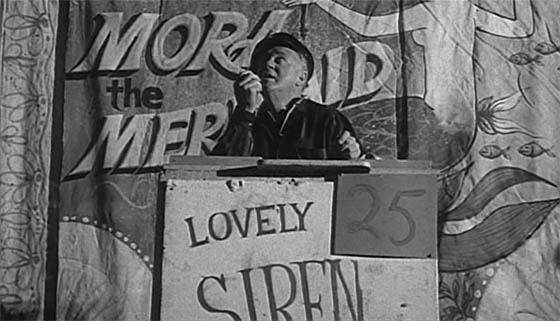 Curtis Harrington’s Night Tide (1961) suggests what might have happened had Jean Cocteau been hired to direct an episode of The Twilight Zone. Perhaps it lacks Cocteau’s style of experimentation, but there is a romantic and eerie quality to this low-budget labor of love which places it in the same universe as Orpheus (1950), another black-and-white fantasy with one foot in the drubby everyday. Harrington had a spotty career, and never quite achieved the breakthrough he deserved; but Night Tide makes his talent obvious. An early effort, it gives the impression that it was shot on the fly and scraped together on pennies, but every shot is gorgeously composed; when assembling stills for this little review I quickly grabbed so many that I realized it would take a novel to use all of them. It’s clear to me now that Night Tide could have been a silent film, so pure and direct and poetic is the cinematic storytelling on display.
Curtis Harrington’s Night Tide (1961) suggests what might have happened had Jean Cocteau been hired to direct an episode of The Twilight Zone. Perhaps it lacks Cocteau’s style of experimentation, but there is a romantic and eerie quality to this low-budget labor of love which places it in the same universe as Orpheus (1950), another black-and-white fantasy with one foot in the drubby everyday. Harrington had a spotty career, and never quite achieved the breakthrough he deserved; but Night Tide makes his talent obvious. An early effort, it gives the impression that it was shot on the fly and scraped together on pennies, but every shot is gorgeously composed; when assembling stills for this little review I quickly grabbed so many that I realized it would take a novel to use all of them. It’s clear to me now that Night Tide could have been a silent film, so pure and direct and poetic is the cinematic storytelling on display.
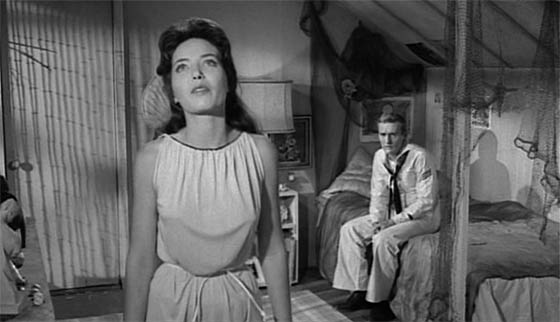 It’s just the story of a sailor and a mermaid, simply, but Harrington takes the familiar fairy tale premise and transposes it onto a mostly-deserted California boardwalk carnival, with ferris wheels and tilt-a-whirls, carnival barkers and sideshows. Into this world walks Johnny (a young Dennis Hopper), making the most of his shore leave by attending a jazz club. Within seconds he has become fixated upon a beautiful brunette named Mora (Linda Lawson), and with a sense of purpose fueled by his own desperate deadline – he won’t be ashore forever – Johnny pursues the girl out of the club, even after she’s casually stuck him with the bill. She shows little interest in Johnny, but with determination he manages to get her name (just before the world’s most awkward lunge for a kiss). Her distraction seems to be the presence of a mysterious woman who lurks in the shadows, watching her, in covert pursuit, but Johnny barely glimpses the stranger. In the morning she’s in better spirits, and all those efforts to win her affections seem to be paying off – perhaps too quickly.
It’s just the story of a sailor and a mermaid, simply, but Harrington takes the familiar fairy tale premise and transposes it onto a mostly-deserted California boardwalk carnival, with ferris wheels and tilt-a-whirls, carnival barkers and sideshows. Into this world walks Johnny (a young Dennis Hopper), making the most of his shore leave by attending a jazz club. Within seconds he has become fixated upon a beautiful brunette named Mora (Linda Lawson), and with a sense of purpose fueled by his own desperate deadline – he won’t be ashore forever – Johnny pursues the girl out of the club, even after she’s casually stuck him with the bill. She shows little interest in Johnny, but with determination he manages to get her name (just before the world’s most awkward lunge for a kiss). Her distraction seems to be the presence of a mysterious woman who lurks in the shadows, watching her, in covert pursuit, but Johnny barely glimpses the stranger. In the morning she’s in better spirits, and all those efforts to win her affections seem to be paying off – perhaps too quickly.
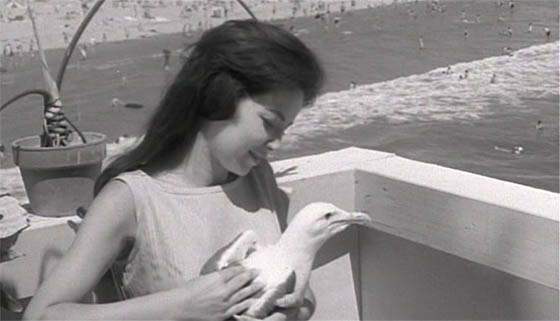 There’s something a little off about Mora. She lives above a carousel, and takes comfort in its intermittent calliope music. While they’re eating seafood upon the balcony of her apartment, she seems to beckon, and easily catches in her arms, a passing seagull, stroking its neck lovingly. She tells him that she’s a mermaid down at the carnival. People pay to have a glimpse of her as she sits in a submerged tank, combing her hair. It’s all fake, she tells him; she wears a phony tail over her legs. The man who runs the show, Captain Murdock (Gavin Muir), claims he found her on a Greek island, and promises to tell Johnny more should he ever drop by his home. Johnny is entranced by all this, with nervous laughter and a wide grin. Watching Dennis Hopper play an innocent, for once, is fascinating: all queasy energy and desperation. His Method approach adds constantly shifting colors to what could otherwise be the simple, and bland, wide-eyed fellow who often fronts these kinds of fables.
There’s something a little off about Mora. She lives above a carousel, and takes comfort in its intermittent calliope music. While they’re eating seafood upon the balcony of her apartment, she seems to beckon, and easily catches in her arms, a passing seagull, stroking its neck lovingly. She tells him that she’s a mermaid down at the carnival. People pay to have a glimpse of her as she sits in a submerged tank, combing her hair. It’s all fake, she tells him; she wears a phony tail over her legs. The man who runs the show, Captain Murdock (Gavin Muir), claims he found her on a Greek island, and promises to tell Johnny more should he ever drop by his home. Johnny is entranced by all this, with nervous laughter and a wide grin. Watching Dennis Hopper play an innocent, for once, is fascinating: all queasy energy and desperation. His Method approach adds constantly shifting colors to what could otherwise be the simple, and bland, wide-eyed fellow who often fronts these kinds of fables.
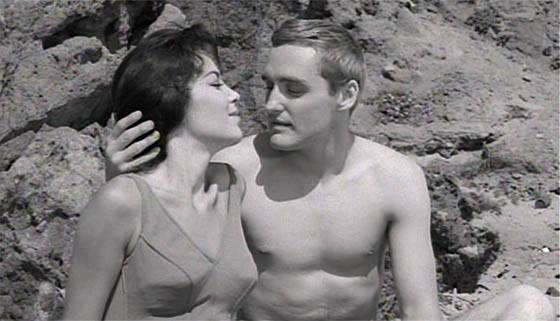
At first, things are going far too well for Johnny. They make out on the beach: happy young lovers. She welcomes him into all facets of her life, including a strangely ritualistic dance to bongos with some beachniks. She also tells him that yes, the captain did rescue her from an island, and he’s like a father to her. But something else is going on; that mysterious woman keeps following Mora, and then Johnny – and Mora seems to be frightened of some looming fate that she refuses to voice. When he finally does pay a visit to Captain Murdock, the man asks Johnny if he’s ever heard of the Greek myth of the Sirens, who would lure sailors to their deaths. When Murdock tells Johnny straight out that yes, Mora really is a mermaid, and to beware the full moon and the night’s high tide, Johnny scoffs; but soon he’s learning that the police have been questioning her. Two of her ex-boyfriends were found dead.
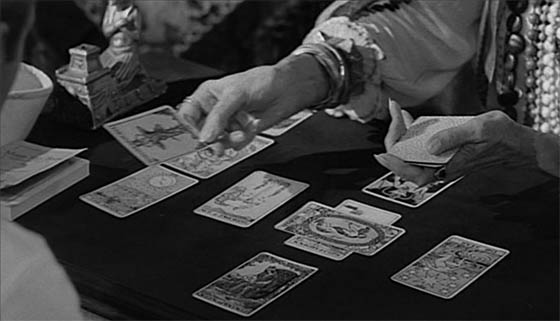 The carnival’s clairvoyant, Madame Romanovitch (Marjorie Eaton), reads his Tarot and seems something ominous in his future. Incidentally, this might be a cinematic first in that the film actually stops and explains, accurately, what the Tarot is and how it works. If the film had been a bigger hit, audiences might have gone flocking to their local occult resalers to get a deck of their own.
The carnival’s clairvoyant, Madame Romanovitch (Marjorie Eaton), reads his Tarot and seems something ominous in his future. Incidentally, this might be a cinematic first in that the film actually stops and explains, accurately, what the Tarot is and how it works. If the film had been a bigger hit, audiences might have gone flocking to their local occult resalers to get a deck of their own.
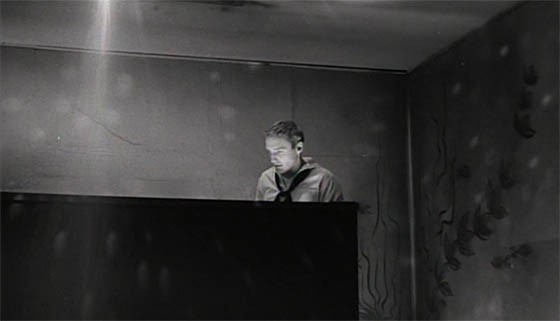 By this point in the film, the audience is convinced they know what’s happening. They don’t. The fact that the twists are not just unpredictable but believable – and, surprisingly, emotionally raw – is Night Tide‘s ace in the hole. The narrative has the feel of a classic short story, one that Melville or Poe might have written; so no wonder that it ends on a quotation by Poe (Roger Corman’s Vincent Price-starring adaptations were a hit at the time). The screenplay, by Harrington, was actually based on his own short story. But the tone could have gone a variety of ways, depending on who was directing and who was cast; it shares something with film noir, for example; particularly the great Nightmare Alley (1947), which is also set in the world of carnival sideshows. The eerie, muted, haunted quality of the vacant boardwalks and unoccupied carousel brings to mind Carnival of Souls (1962), and there are touches of the horror film, particularly in Johnny’s increasingly paranoid fantasies as he begins to question Mora’s nature. There’s a wonderful moment, which recalls Roman Polanski’s style, when Dennis Hopper, having just dreamed of Mora as a mermaid, awakens and finds himself tracking her wet footprints out of the bathtub and down the hallway. With him, we study them closely to ensure they remain human with every print.
By this point in the film, the audience is convinced they know what’s happening. They don’t. The fact that the twists are not just unpredictable but believable – and, surprisingly, emotionally raw – is Night Tide‘s ace in the hole. The narrative has the feel of a classic short story, one that Melville or Poe might have written; so no wonder that it ends on a quotation by Poe (Roger Corman’s Vincent Price-starring adaptations were a hit at the time). The screenplay, by Harrington, was actually based on his own short story. But the tone could have gone a variety of ways, depending on who was directing and who was cast; it shares something with film noir, for example; particularly the great Nightmare Alley (1947), which is also set in the world of carnival sideshows. The eerie, muted, haunted quality of the vacant boardwalks and unoccupied carousel brings to mind Carnival of Souls (1962), and there are touches of the horror film, particularly in Johnny’s increasingly paranoid fantasies as he begins to question Mora’s nature. There’s a wonderful moment, which recalls Roman Polanski’s style, when Dennis Hopper, having just dreamed of Mora as a mermaid, awakens and finds himself tracking her wet footprints out of the bathtub and down the hallway. With him, we study them closely to ensure they remain human with every print.
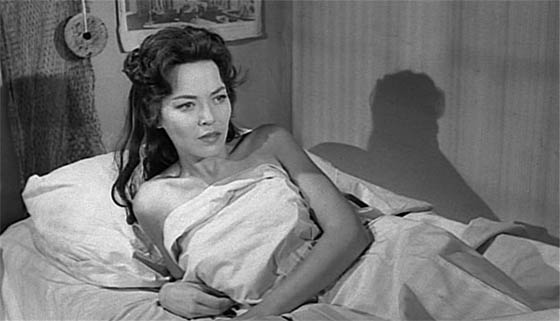 Harrington doesn’t settle on a genre, but pitches his tone toward something lyrical and sad; even the early, happy moments have a peculiar weight of tragedy to them, as though we’re seeing events long after they’ve occurred, and we know something unfortunate awaits these characters. So the film’s shift into suspense mode, accompanied by some hallucinogenic passages, is not jarring, but has the feeling of the inevitable. The spare cast is effectively used, and there’s also a nice turn by Luana Anders as Ellen, the lovelorn daughter of the carousel operator, who patiently waits for Hopper to notice how much she cares for him, as he stumbles down his own dark alleys; note the moment at a police station, where, just as Hopper leaves, Harrington turns his camera about to take notice of Anders leaning out the door, looking after him as he goes, betraying a girlish excitement she otherwise keeps carefully guarded. Observe, too, how Linda Lawson’s Mora seems otherworldly in most every shot. In one scene, in which she walks slowly down a hallway, clad only in a towel, Harrington lets the walls and ceiling capture the flickering, aquatic light that’s cast, presumably, from the bathtub in the next room, making it appear that she’s submerged. Later she lies upon her side in bed, watching Hopper, and the fishing net hanging from the wall behind her makes her look like she’s been snagged and dragged up and out of the depths. When she’s lured by the “night tide,” and stands under a pier looking up at the moon, the wooden post is at her back, so she might be either a siren perched upon the rocks or a ship’s figurehead. As for Hopper, he proves late in the film that he’s not afraid of displaying naked emotion, even exposing his character’s flaws: his immaturity and borderline cowardice. It’s a reminder of how risky and powerful an actor Dennis Hopper could be.
Harrington doesn’t settle on a genre, but pitches his tone toward something lyrical and sad; even the early, happy moments have a peculiar weight of tragedy to them, as though we’re seeing events long after they’ve occurred, and we know something unfortunate awaits these characters. So the film’s shift into suspense mode, accompanied by some hallucinogenic passages, is not jarring, but has the feeling of the inevitable. The spare cast is effectively used, and there’s also a nice turn by Luana Anders as Ellen, the lovelorn daughter of the carousel operator, who patiently waits for Hopper to notice how much she cares for him, as he stumbles down his own dark alleys; note the moment at a police station, where, just as Hopper leaves, Harrington turns his camera about to take notice of Anders leaning out the door, looking after him as he goes, betraying a girlish excitement she otherwise keeps carefully guarded. Observe, too, how Linda Lawson’s Mora seems otherworldly in most every shot. In one scene, in which she walks slowly down a hallway, clad only in a towel, Harrington lets the walls and ceiling capture the flickering, aquatic light that’s cast, presumably, from the bathtub in the next room, making it appear that she’s submerged. Later she lies upon her side in bed, watching Hopper, and the fishing net hanging from the wall behind her makes her look like she’s been snagged and dragged up and out of the depths. When she’s lured by the “night tide,” and stands under a pier looking up at the moon, the wooden post is at her back, so she might be either a siren perched upon the rocks or a ship’s figurehead. As for Hopper, he proves late in the film that he’s not afraid of displaying naked emotion, even exposing his character’s flaws: his immaturity and borderline cowardice. It’s a reminder of how risky and powerful an actor Dennis Hopper could be.
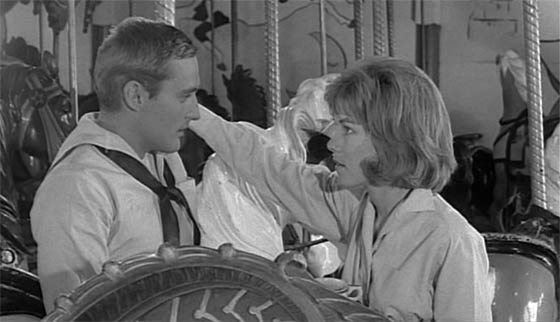 And all for this “minor” film, a B-picture too understated and sophisticated for most of its peers. But it’s hypnotic, too – and lit with a bit of the full moon’s magic.
And all for this “minor” film, a B-picture too understated and sophisticated for most of its peers. But it’s hypnotic, too – and lit with a bit of the full moon’s magic.









